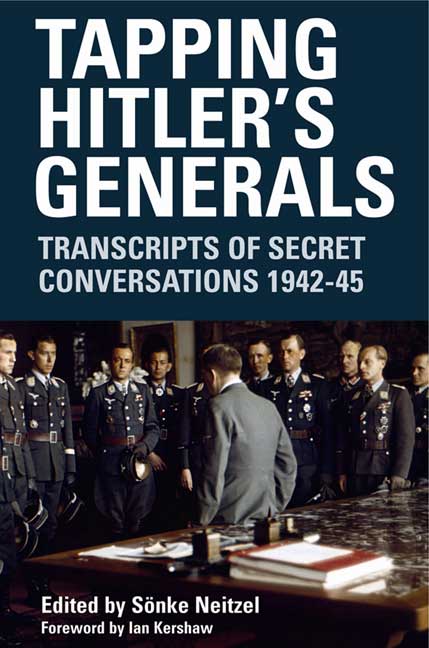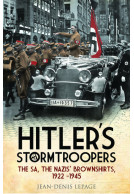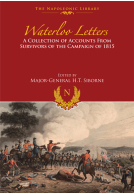Tapping Hitler's Generals (ePub)
Transcripts of Secret Conversations 1942–45

File Size: 2.7 MB (.epub)
Pages: 416
ISBN: 9781783830558
Published: 18th October 2007
'A goldmine of information about what the German High Command privately thought of the war, Adolf Hitler, the Nazis and each other' – Andrew Roberts
'One of the most important books on World War II to be published in the last thirty years' – Tim Newark
Between 1939 and 1942, a division of the British Directorate of Military Intelligence created a number of PoW interrogation camps in and around London. Sophisticated tapping equipment was installed and secret gramophone recording were made of private conversations between senior German staff officers.
In this extraordinary work Professor Neitzel examines these transcripts in depth for the first time. His findings are truly revealing and address important questions regarding the officers' attitudes towards the German leadership and Nazi policies: How did the German generals judge the overall war situation? From what date did they consider it lost? How did they react to the attempt on Hitler's life in July 1944? What knowledge did they have of the atrocities?
By turns insightful and horrifying, this unprecedented research is a must for any serious scholar of the period and anyone interested in exploring the truth behind the image of an 'unblemished Wehrmact'.
This edition includes a revised introduction.
Located in an idyllic setting north of London, Trent Park was an historic mansion house used by British Intelligence during WWII as its Combined Services Detailed Interrogation Centre for the UK. Detained there were officers not only from the German Army, but also the navy, Air Force and Waffen SS, whose conversations were carefully monitored and recorded by staff in the so-called 'M-Room', using what was then the most modern technology. What emerges is interesting, for all sorts of reasons. Editor Sonke Neitzel here reproduces, in one volume, a selection of nearly 200 of the transcripts, opting for a thematic rather than chronological arrangement of the material. Key issues are presented under three main headings: 'Politics, Strategy and Different Camps' (Documents 1-82); 'War Crimes' (83-144) and 'Reactions to 20 July 1944' (145-167). These incorporate first-hand accounts of events from around 90 of the officers passing through the Centre between the years 1942 and 1945. If, as Ian Kershaw points out in the Introduction, there are not representative in the strictly 'scientific' sense, they are, nevertheless, indicative of a wide range of opinion. Officers did generally divide into two opposite camps, however, as personified by Generals Cruwell and von Thoma.
Stephanie A. Jefford
Covert recording could, and did, bypass many of the difficulties associated with direct interrogation: the subjects, surprisingly enough, let their guard down and spoke their mind. This makes it possible for us to arrive at an estimate of the extent to which Nazism had taken root within the military, and what officers knew, or at any rate suspected, about war crimes and crimes against humanity. Were atrocities the work of the SS and police alone, or did the Wehrmacht have any part to play? Was it true that refusing to obey an order would get a man shot? Answers to these and other questions will be found in these pages, and challenge much of the mythology which has been in circulation ever since the war ended (see pp. 204-5; 207-8; 217; 218; 221 and 223). Some of this makes chilling reading. Revelations include events from the Holocaust not documented elsewhere and a direct admission from someone not previously thought by historians to have been a perpetrator (see Docs. 106, 116 and 129).
We find out where officers stood on the questions of the Oath of Allegiance and Military necessity, how Hitler was able to manipulate potentially difficult commanders like Dietrich and Guderian and, sensationally, learn for the first time of the fear within the Nazi Leader himself as the war span out of control ("breathing fire, scared and shaking", according to one observer).
Professor Neitzel prefaces the whole with scholarly analysis of the background to, and content of, these important records and follows them with biographical notes on the dramatis personae. And as these transcripts were not declassified until 1996, we may safely assume that most of the participants died without ever realising they had been 'tapped'!
One of the best books on the intelligence war published in the last decade.
World War II Quarterly
A compelling read.
Nicholas Clee, The Bookseller
Fascinating and chilling.
BBC History Magazine
One of the most important books on World War II to be published in the last thirty years, this is a fascinating collection of documents with an illuminating commentary and introduction.
Tim Newark
These extracts exert a grim fascination. They represent a unique and unmediated window into the minds of a military elite brutalised by the First World War, embittered by what they saw as Germany's unjust treatment, and finally ensnared in the seductive coils of Hitler's radical nationalism.
Richard Overy, The Daily Telegraph
Sönke Nietzel's fine book is essential reading. Anyone who wants to understand the part the German army played in Nazi atrocities should start here.
Gary Sheffield
Professor Neitzel’s research opens up to us previously untapped rich sources for exploring the mentality of Germany’s military elite . . . For this excellent edition we are very much in his debt.
Ian Kershaw
A goldmine of information about what the German High Command privately thought of the war, Adolph Hitler, the Nazis and each other.
Andrew Roberts, Daily Mail
Outstanding scholarship creates vivid portraits through the secretly recorded conversations of captive German generals; a powerful insight not only into World War Two history in the uncensored words of those who made it but also of how those minds reacted to captivity. The two factions which formed around the anti nazi General Von Thoma & the very pro nazi General Cruwell illustrate better than any example I can recall the innate hypocrisy of the Third Reich & those that served it so slavishly. Biographies & detailed notes make this book a feast. I would recommend this book not only to those interested in history but also psychology.
Amazon five star review
Sonke Nietzel's fine book TAPPING HITLER'S GENERALS is essential reading. Anyone who wants to understand the part the German army played in Nazi atrocities should start here.
Gary Sheffield Professor of War Studies
One of the best books on the intelligence war published in the last decade.
World War II Quarterly 2008
These extracts exert a grim fascination. They represent a unique and unmediated window into the minds of a military elite brutalised by the First World War, embittered by what they saw as Germany's unjust treatment, and finally ensnared in the seductive coils of Hitler's radical nationalism.
The Daily Telegraph - Aug 2007
Fascinating and chilling
BBC History Magazine
A compelling read
Nicholas Clee, former editor of The Bookseller
About Sonke Neitzel
SÖNKE NEITZEL is Professor of International History at the London School of Economics, having also held positions at the universities of Glasgow, Saarbrucken, Bern and Mainz. He is the author of seven books, including the best-selling Soldaten: On Fighting, Killing and Dying and appeared on the major Channel 4 documentary Spying on Hitler’s Army.
About Ian Kershaw
Ian Kershaw is one of the world's leading authorities on Hitler and was Professor of Modern History at the University of Sheffield. He is the author of The Hitler Myth: Image and Reality in the Third Reich and Hitler, 1936-1945: Nemesis.

















